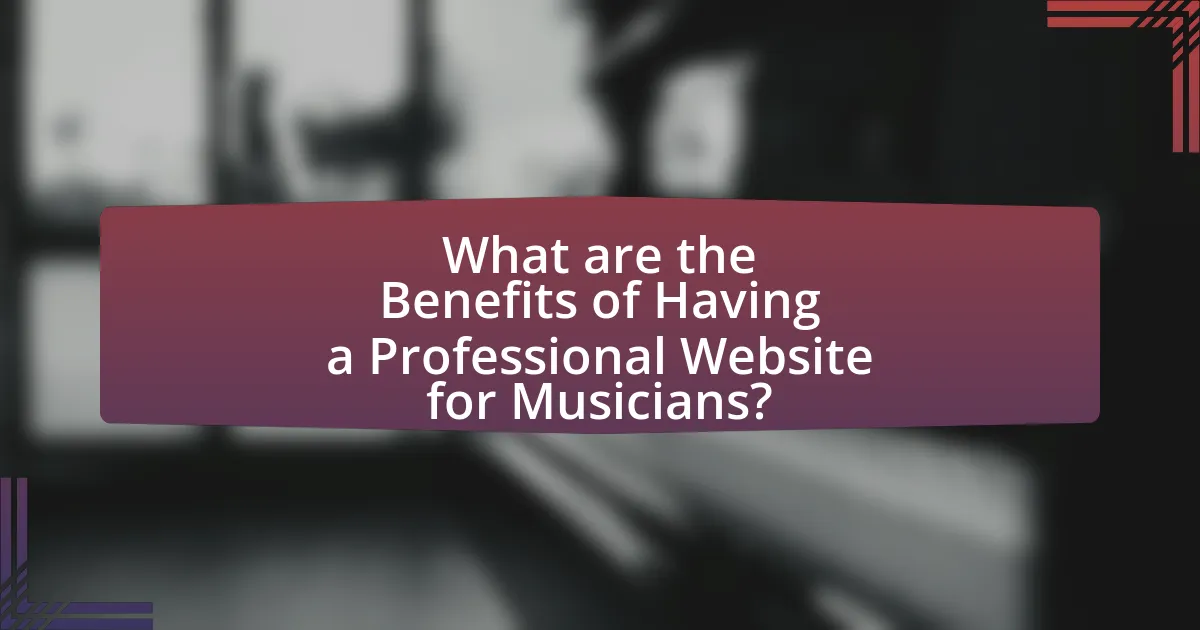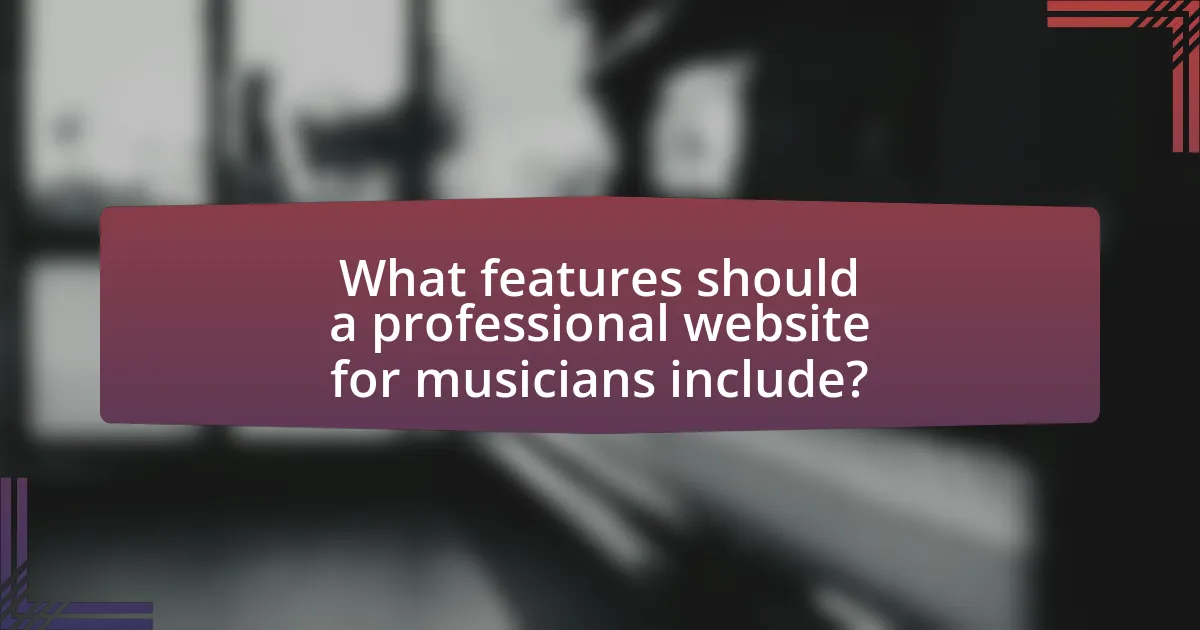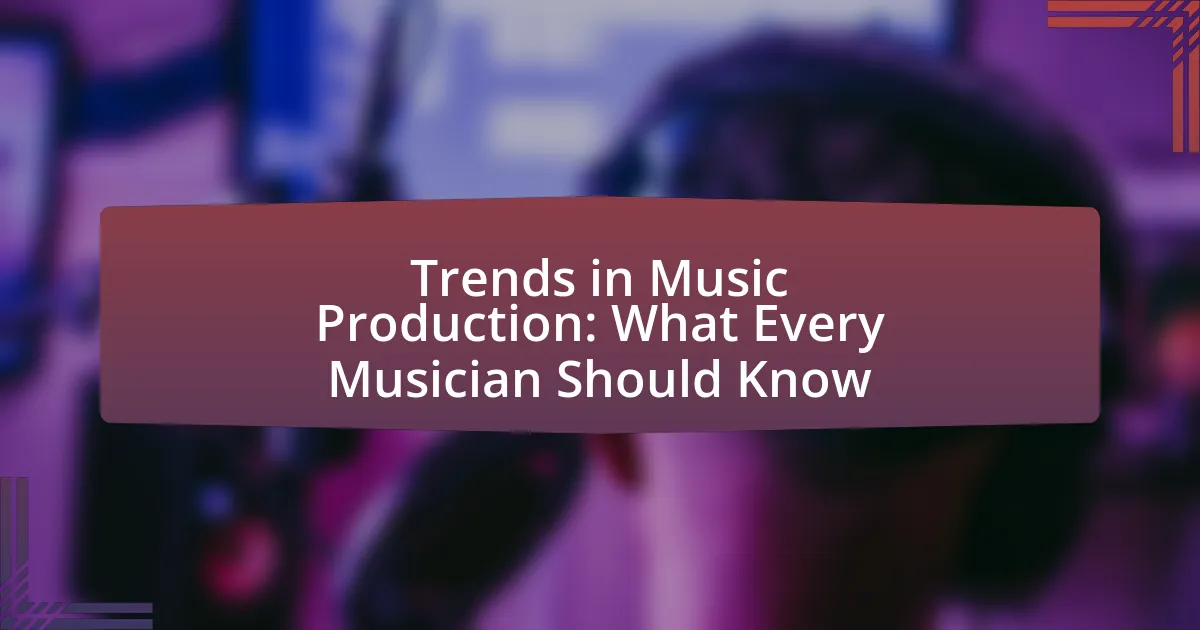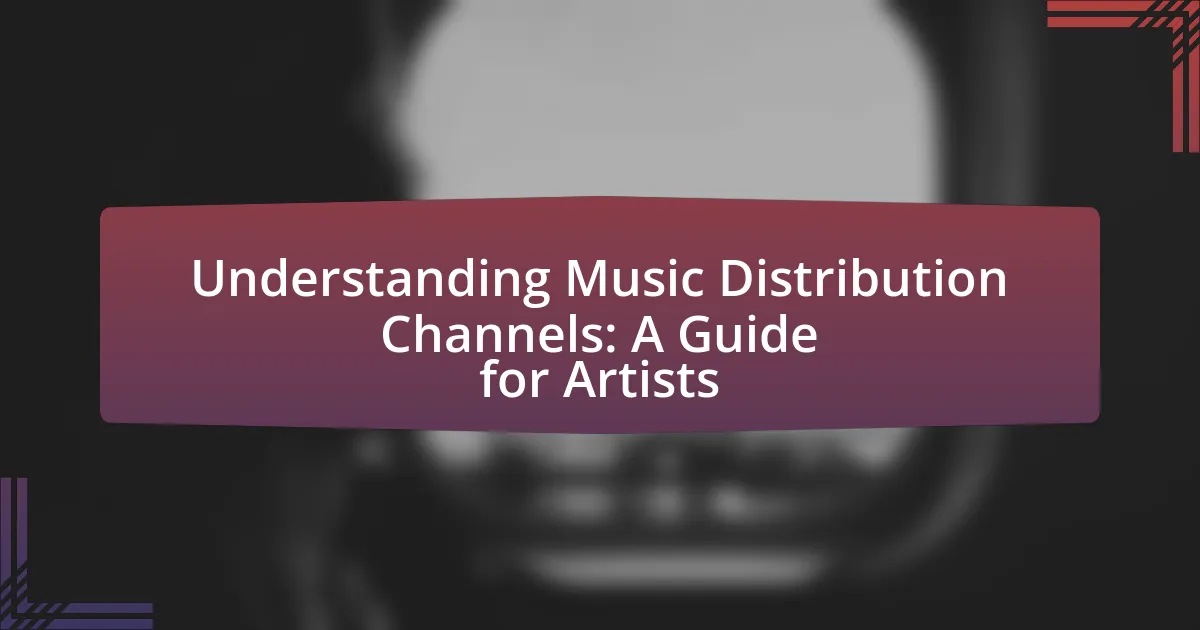A professional website is essential for musicians as it serves as a centralized platform to showcase their work, connect with fans, and promote their brand. The article outlines the benefits of having a well-designed website, including enhanced credibility, increased visibility through search engine optimization (SEO), and improved fan engagement. Key elements contributing to a strong online presence are discussed, such as active social media engagement, consistent content creation, and the importance of a professional appearance. Additionally, the article highlights how a professional website differentiates musicians from their competition, facilitates booking opportunities, and creates financial benefits through merchandise sales and direct fan interactions.

What are the Benefits of Having a Professional Website for Musicians?
Having a professional website provides musicians with a centralized platform to showcase their work, connect with fans, and promote their brand. A well-designed website enhances credibility, as 75% of users admit to making judgments about a company’s credibility based on its website design. Additionally, a professional website allows musicians to control their narrative, share music, sell merchandise, and provide updates on performances, which can lead to increased fan engagement and revenue. Furthermore, search engine optimization (SEO) strategies can improve visibility, making it easier for new listeners to discover their music online.
How does a professional website enhance a musician’s online presence?
A professional website enhances a musician’s online presence by providing a centralized platform for showcasing their work, engaging with fans, and promoting their brand. This dedicated space allows musicians to display their music, videos, and upcoming events, which increases visibility and accessibility. According to a survey by the Music Industry Research Association, 70% of music consumers prefer to discover new artists through their official websites rather than social media platforms. This statistic underscores the importance of a professional website in establishing credibility and attracting a larger audience. Additionally, a well-designed website can improve search engine rankings, making it easier for potential fans to find the musician online.
What elements contribute to a strong online presence for musicians?
A strong online presence for musicians is primarily built on a professional website, active social media engagement, and consistent content creation. A professional website serves as a central hub for showcasing music, providing information about upcoming events, and facilitating merchandise sales. Active engagement on social media platforms like Instagram, Facebook, and Twitter allows musicians to connect with fans, share updates, and promote their work effectively. Consistent content creation, including regular music releases, videos, and behind-the-scenes insights, keeps the audience engaged and fosters a loyal fanbase. According to a 2021 survey by the Music Industry Research Association, 70% of musicians reported that a well-maintained website significantly enhanced their visibility and opportunities in the industry.
How does a professional website differentiate musicians from their competition?
A professional website differentiates musicians from their competition by showcasing their unique brand identity, music portfolio, and engaging content. This distinct online presence allows musicians to present high-quality visuals, audio samples, and personal narratives that resonate with their target audience. According to a survey by the Music Industry Research Association, 70% of music consumers prefer artists with well-designed websites, indicating that a professional site significantly enhances perceived credibility and professionalism. Furthermore, features such as integrated social media, merchandise sales, and event calendars create a comprehensive platform that not only attracts fans but also fosters community engagement, setting musicians apart in a crowded market.
Why is a professional website essential for music promotion?
A professional website is essential for music promotion because it serves as a central hub for an artist’s brand, music, and engagement with fans. This platform allows musicians to showcase their work, share updates, and connect directly with their audience, which is crucial in a competitive industry. According to a survey by the Music Industry Research Association, 70% of music consumers prefer to discover new artists through official websites rather than social media platforms. This statistic underscores the importance of having a dedicated space that reflects the artist’s identity and provides comprehensive information about their music, upcoming events, and merchandise.
How can a website serve as a central hub for a musician’s promotional efforts?
A website can serve as a central hub for a musician’s promotional efforts by consolidating all promotional materials and information in one accessible location. This centralization allows musicians to showcase their music, share tour dates, and provide links to purchase merchandise or tickets, enhancing visibility and engagement with fans. For instance, a study by the Music Industry Research Association found that musicians with dedicated websites experience a 30% increase in fan engagement compared to those relying solely on social media platforms. Additionally, a professional website can improve search engine optimization (SEO), making it easier for potential fans to discover the musician online.
What role does a website play in connecting with fans and industry professionals?
A website serves as a central hub for musicians to connect with fans and industry professionals. It allows musicians to showcase their work, share updates, and engage directly with their audience, fostering a sense of community. Additionally, a professional website enhances credibility, making it easier for industry professionals to discover and evaluate an artist’s talent. According to a survey by the Music Industry Research Association, 70% of industry professionals prefer to review an artist’s website over social media profiles when considering collaborations or bookings, highlighting the website’s critical role in professional networking.
How does a professional website impact a musician’s career?
A professional website significantly enhances a musician’s career by serving as a central hub for their brand, music, and promotional activities. This online presence allows musicians to showcase their work, connect with fans, and attract industry professionals. According to a survey by the Music Industry Research Association, 70% of music industry professionals consider a well-designed website essential for an artist’s credibility. Furthermore, a professional website can improve visibility through search engine optimization, making it easier for potential listeners and collaborators to discover the musician’s work.
What opportunities does a professional website create for musicians?
A professional website creates numerous opportunities for musicians, including enhanced visibility, direct fan engagement, and revenue generation. By establishing an online presence, musicians can reach a global audience, as over 4.9 billion people use the internet, allowing them to showcase their music, share updates, and connect with fans directly. Furthermore, a professional website can serve as a platform for selling merchandise and music, with e-commerce capabilities enabling musicians to monetize their work effectively. Additionally, having a dedicated space for promoting events and tours can lead to increased ticket sales, as fans can easily access information about upcoming performances. Overall, a professional website is essential for musicians to build their brand, engage with their audience, and create sustainable income streams.
How can a website facilitate booking gigs and collaborations?
A website can facilitate booking gigs and collaborations by providing a centralized platform for musicians to showcase their work, connect with potential collaborators, and manage bookings efficiently. It allows musicians to display their portfolio, including audio samples, videos, and bios, which helps attract interest from venues and other artists. Additionally, integrated scheduling tools and contact forms streamline the booking process, making it easier for interested parties to reach out and negotiate terms. According to a survey by Sonicbids, 70% of music professionals believe that having a professional website is essential for securing gigs, highlighting its importance in the industry.
What are the financial benefits of having a professional website?
A professional website provides significant financial benefits by enhancing visibility, attracting more clients, and increasing revenue streams. Research indicates that businesses with a professional online presence can see a revenue increase of up to 23% compared to those without. Additionally, a well-designed website can improve conversion rates, with studies showing that 75% of users judge a company’s credibility based on its website design. This credibility can lead to higher sales and more opportunities for monetization, such as merchandise sales, ticket sales, and digital downloads for musicians.
How does a professional website improve a musician’s branding?
A professional website enhances a musician’s branding by providing a centralized platform for showcasing their music, biography, and visual identity. This online presence allows musicians to establish credibility and professionalism, which is crucial in a competitive industry. For instance, a well-designed website can increase audience engagement by offering features such as music streaming, merchandise sales, and concert information, thereby fostering a stronger connection with fans. Additionally, statistics show that 75% of consumers judge a company’s credibility based on its website design, highlighting the importance of a professional appearance in building trust and recognition in the music market.
What branding elements should be included on a musician’s website?
A musician’s website should include branding elements such as a professional logo, consistent color scheme, high-quality images, and a clear typography style. These elements establish a recognizable identity and enhance the overall aesthetic appeal of the site. For instance, a professional logo serves as a visual representation of the musician’s brand, while a consistent color scheme creates a cohesive look that aligns with the musician’s genre and personality. High-quality images, including album covers and promotional photos, engage visitors and convey professionalism. Clear typography ensures that text is easily readable, contributing to a positive user experience. Collectively, these branding elements not only attract fans but also reinforce the musician’s image in a competitive industry.
How does consistent branding across a website enhance recognition?
Consistent branding across a website enhances recognition by creating a cohesive visual identity that users can easily identify and remember. This uniformity in elements such as color schemes, typography, and imagery fosters familiarity, which is crucial for brand recall. Research indicates that consistent branding can increase revenue by up to 23%, as consumers are more likely to engage with brands they recognize and trust. Therefore, musicians who maintain consistent branding on their websites can effectively strengthen their presence and connection with their audience.

What features should a professional website for musicians include?
A professional website for musicians should include a portfolio showcasing their music, a biography, a calendar of events, a contact form, and links to social media. The portfolio allows musicians to display their work, while the biography provides background information that helps fans connect with them. A calendar of events informs fans about upcoming performances, and a contact form facilitates communication for bookings and inquiries. Links to social media enhance engagement and allow fans to follow the musician’s updates. These features collectively create a comprehensive online presence that is essential for promoting a musician’s career.
What essential pages should every musician’s website have?
Every musician’s website should have essential pages including a homepage, biography, music or discography, tour dates, contact information, and a media gallery. The homepage serves as the introduction, providing a snapshot of the musician’s brand. The biography page offers background information, showcasing the musician’s journey and achievements, which helps build a connection with fans. The music or discography page displays the musician’s work, allowing visitors to listen to or purchase tracks, which is crucial for monetization. Tour dates inform fans about upcoming performances, enhancing engagement and attendance. The contact information page facilitates communication for booking inquiries and fan interactions. Lastly, a media gallery featuring photos and videos enhances the visual appeal of the site, providing fans with engaging content. These pages collectively create a comprehensive online presence that is vital for a musician’s success.
How do an artist bio and discography contribute to a musician’s website?
An artist bio and discography significantly enhance a musician’s website by providing essential information that establishes credibility and engages visitors. The artist bio offers a narrative that highlights the musician’s background, influences, and achievements, which helps to create a personal connection with the audience. This connection can lead to increased fan loyalty and interest in the musician’s work.
The discography showcases the musician’s body of work, including albums, singles, and collaborations, which serves as a portfolio that demonstrates their artistic evolution and versatility. This information is crucial for potential fans, industry professionals, and media, as it allows them to assess the musician’s style and contributions to the music industry.
Research indicates that websites with comprehensive artist bios and discographies attract more traffic and engagement, as they provide visitors with the context and content they seek. Therefore, both elements are vital for building a professional online presence that can lead to greater opportunities in the music industry.
What is the importance of a media gallery on a musician’s website?
A media gallery on a musician’s website is crucial for showcasing their work and engaging with fans. It serves as a visual portfolio that includes images, videos, and audio clips, allowing visitors to experience the musician’s artistry and performances. This multimedia content enhances the website’s appeal, making it more likely for fans to share and promote the musician’s brand. According to a study by the International Federation of the Phonographic Industry, 70% of music consumers engage with artists through visual content, highlighting the importance of a media gallery in attracting and retaining audience interest.
How can musicians optimize their websites for better engagement?
Musicians can optimize their websites for better engagement by implementing user-friendly design, ensuring mobile responsiveness, and incorporating interactive elements. A user-friendly design enhances navigation, allowing visitors to easily find music, tour dates, and merchandise, which can increase time spent on the site. Mobile responsiveness is crucial, as over 50% of web traffic comes from mobile devices, making it essential for musicians to provide a seamless experience across all platforms. Additionally, incorporating interactive elements such as embedded music players, videos, and social media feeds can encourage visitor interaction, leading to higher engagement rates. Studies show that websites with interactive content can increase user engagement by up to 70%, demonstrating the effectiveness of these strategies.
What strategies can be used to improve website navigation and user experience?
To improve website navigation and user experience, musicians should implement clear menu structures, intuitive layouts, and responsive design. A clear menu structure allows users to easily find information, while an intuitive layout enhances usability by organizing content logically. Responsive design ensures that the website functions well on various devices, accommodating users who access the site via smartphones or tablets. According to a study by Google, 61% of users are unlikely to return to a mobile site they had trouble accessing, highlighting the importance of these strategies in retaining visitors and enhancing overall user satisfaction.
How can musicians utilize SEO to increase website visibility?
Musicians can utilize SEO by optimizing their website content with relevant keywords, improving site structure, and enhancing user experience to increase visibility. By incorporating keywords related to their music genre, location, and specific terms that potential fans might search for, musicians can improve their rankings on search engines. Additionally, ensuring that the website is mobile-friendly and loads quickly contributes to better user engagement, which is a factor in search engine algorithms. According to a study by HubSpot, 75% of users never scroll past the first page of search results, highlighting the importance of SEO in driving traffic to a musician’s website.
What are some best practices for maintaining a professional website?
To maintain a professional website, regularly update content, ensure mobile responsiveness, and optimize for search engines. Regular content updates keep the website relevant and engaging, which can improve user retention and search engine rankings. Mobile responsiveness is crucial as over 50% of web traffic comes from mobile devices, making it essential for user experience. Search engine optimization (SEO) enhances visibility, with 75% of users never scrolling past the first page of search results, emphasizing the need for effective SEO strategies.
How often should musicians update their website content?
Musicians should update their website content at least once a month. Regular updates keep the website fresh, improve search engine rankings, and engage fans with new information such as upcoming shows, new releases, or blog posts. According to a study by HubSpot, websites that are updated frequently can see a 55% increase in traffic, demonstrating the importance of consistent content refreshment for visibility and audience engagement.
What tools can musicians use to track website performance and engagement?
Musicians can use tools like Google Analytics, SEMrush, and Hotjar to track website performance and engagement. Google Analytics provides detailed insights into website traffic, user behavior, and demographics, allowing musicians to understand their audience better. SEMrush offers analytics on website performance, including SEO metrics and competitor analysis, which helps musicians optimize their online presence. Hotjar enables musicians to visualize user interactions through heatmaps and session recordings, providing valuable feedback on how visitors engage with their site. These tools collectively empower musicians to make data-driven decisions to enhance their online presence and connect with their audience effectively.





